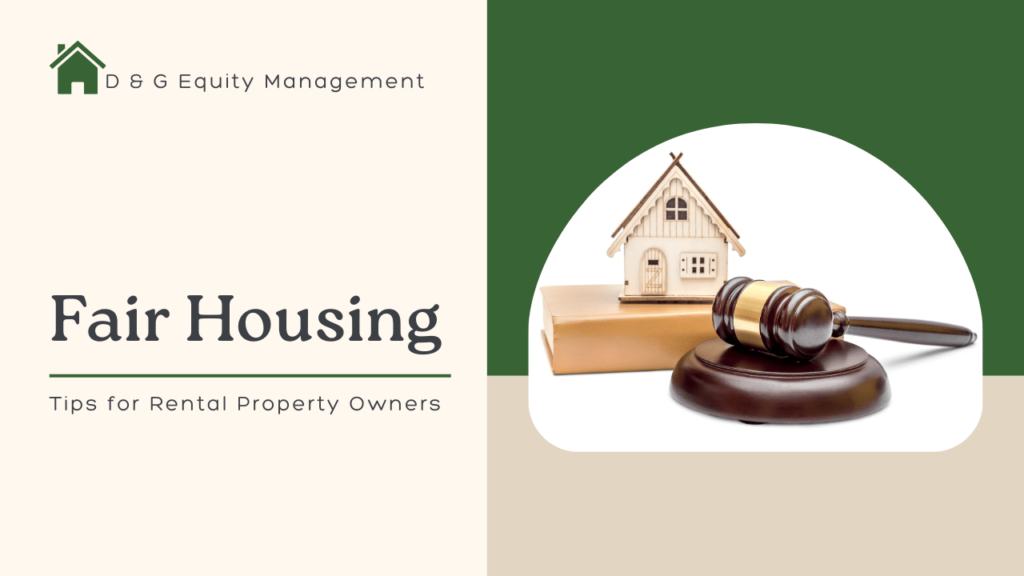
Renting out a property in Sonoma County, you likely understand that California has a lot of strict rental laws and tenant protections in place. There’s rent control and just cause eviction for qualifying properties, security deposit restrictions and requirements, and even nuanced laws about things like allowing e-bikes and providing for organic waste recycling.
Perhaps the most important state and federal laws that rental property owners in Sonoma County must understand are those pertaining to fair housing. Equal access must be provided to all residents of California, and discrimination of any kind is prohibited by law. If you’re like most rental property owners, you’d never set out to discriminate against someone intentionally. However, the laws are specific and include how you market your property, treat your tenants, and make accommodations to those who need them.
As Sonoma County property managers, we are constantly educating ourselves on fair housing requirements and best practices. The California Department of Real Estate requires ongoing training around fair housing issues. Those of us bound to these laws include landlords, property sellers and property owners, property managers, insurance agents, brokers, lenders, HOAs, and others.
We want to provide some tips in case you’re not as familiar with fair housing as you should be. It’s always a good idea to work with a local property management expert. We can help you avoid unintentional legal mistakes and missteps, which can actually be quite costly.
Let’s take a close look at fair housing.
Understanding Protected Classes (Federal and State)
Federal laws and California laws prohibit any sort of discrimination against identified protected classes of individuals. The federal government, through the Department of Housing and Urban Development (HUD), identifies these following seven classes as protected:
- Race
- Color
- Religion
- Sex
- Disability
- National origin
- Familial status
It’s unlawful to discriminate against people based on any of those characteristics. You can’t not rent to someone because they have six kids or they’re a member of a specific church or they were born in another country, for example.
As you might expect, the state of California goes even further. There are far more protected classes under state fair housing laws than federal. When we’re talking about your fair housing requirements in Sonoma County, you have all of those seven classes we mentioned above plus:
- Criminal history (non-relevant convictions)
- Primary language
- Ancestry
- Immigration status
- Marital status
- Pregnancy
- Status as a victim of domestic violence or stalking
- Political affiliation
- Age
- Sexual orientation
- Gender identity and gender expression
- Medical condition
- Genetic information
- Military or veteran status
- Source of income
Rental property owners and their property managers must be cautious not to discriminate, consciously or unconsciously, against individuals belonging to these classes when choosing tenants, setting rental terms, granting privileges, or applying services and rules. Establish an objective and consistent process and put all of your rental criteria in writing so that tenants know what you’re looking for before they even apply.
It’s so easy to make a mistake. If you waive a late fee for one tenant but not another, for example, you could be seen as discriminating against the tenant who had to pay the late fee. Consistency and documentation is so important in demonstrating your objectivity and fairness.
Typical Fair Housing Issues in Sonoma County
While attention to fair housing is required in all of your leasing, marketing, screening, and management practices, we’ve found that it can be especially easy to make a mistake when you’re advertising your rental home and screening your tenants. Here are some best practices that we follow as Sonoma County property managers to ensure we’re respectful of and compliant with all fair housing laws.
- Advertising Sonoma County Rental Properties
The language used in your rental property advertisements online should never indicate preference, limitation, or discrimination based on any protected class. Pay attention to your listings and your posts to ensure that phrases such as “great for singles” or “suitable for a mature couple” are not included. This could be considered discriminatory and should be avoided. Instead, focus on ways in which a property is attractive to everyone. Talk about its features, such as large bedrooms, updated kitchens, or fenced yards. Don’t discuss the type of tenant who might appreciate a home. It separates your tenant pool and could violate fair housing laws.
- Qualifying Rental Criteria
Screening has to be fair, objective, and impartial. You must hold every applicant to the same standards. As property managers, we have the necessary screening software and technology to ensure that most of our background checking is automated and therefore fair housing compliant. It’s also important to establish qualifying rental criteria and to provide that criteria to potential tenants before they apply for your property. Establish what is required from a tenant in order to be approved for your property, and document it in writing. This should be provided to any potential applicant who is interested in renting your home.
- Service and Companion Animals
Because tenants with disabilities are a protected class, you have to allow service animals and companion animals. Service animals are easily identified and come with their own paperwork and set of skills. They are almost always dogs. Companion animals, or emotional support animals, aren’t always easy to identify. They could be anything. You’re permitted to ask for documentation from a medical provider, and recent laws require that medical provider to have seen the patient in person and worked with them for a specific period of time.
- Criminal Background Checks
You’re permitted to run a criminal history check when you have written consent from the applicant, but you will be violated fair housing laws if it has an unjustified discriminatory effect on a protected class. You cannot always control this. Be careful with criminal background checks, and if you deny an application based on criminal history, make sure it’s relevant.
- Section 8 Tenant Accessibility
Source of income is one of those protected classes under state fair housing laws. This means that you cannot refuse to consider a tenant with Section 8 benefits, as long as they meet your qualifying rental criteria. Those housing benefits can be considered income.
Reasonable Accommodations and Modifications
Disability law is one of the fastest growing legal areas. That’s because disabilities are better documented and understood now than they ever have been. And because you cannot discriminate against any tenants based on a physical, emotional, or intellectual disability, you need to understand that this means you may have to make accommodations for tenants who have a disability.
Maybe you have a strict no-pets policy in your property. That’s fine, but if a tenant arrives with a service animal, you not only have to allow that animal, but you cannot treat it as a pet. There can be no pet fee. No pet rent. No restriction on breeds or size. The law does not see that animal as a pet. It’s seen as an accommodation.
You may have a tenant who needs modifications in order to comfortably live in your home. The purpose of these accommodations or modifications is to ensure your tenant with a disability can use your property in the same way as a tenant without such disabilities.
Typically, this will be a wheelchair ramp or grab bars in the shower. It might mean a dedicated parking space.
Who pays for the accommodations? The resident can be required to pay for them, but as the property owner, you must provide them. Landlords must allow and may be required to make reasonable accommodations for individuals with disabilities. This includes modifications to existing premises, as long as it does not create undue financial and administrative burdens.
Compliance Tips for Sonoma County Rental Property Owners
To stay compliant with fair housing laws in Sonoma County and throughout California, consider the following:
- Educate yourself regularly on fair housing laws. If you do not have the time, resources, or interest in staying up to date on all the latest laws and court rulings, you’ll want to make sure you’re working with a Sonoma County property manager. There’s just too much risk involved in violating a law.
- Develop non-discriminatory screening processes for tenants. Document your screening criteria and provide it to potential applicants before they complete your application and pay the screening fee.
- Keep up-to-date records of all tenant interactions and applications. Digital and paper files are best.
- Consult with a fair housing attorney, if needed, to ensure all practices are law-abiding.
By understanding and respecting the federal and state fair housing laws, we believe that housing providers in Sonoma County and property managers across the state can not only avoid legal complications but also contribute positively to the communities that we serve.
We know that it can be tricky to navigate the wide range of laws that come with renting out a property, and we’re here to help. Please don’t hesitate to contact us at D & G Equity Management when you need help with your Sonoma County investment properties.
 Experienced Sonoma County property managers, D & G Equity Management serves area landlords and real estate investors with furnished or unfurnished single family homes, multi-unit properties and commercial units throughout the Sonoma County area.
Experienced Sonoma County property managers, D & G Equity Management serves area landlords and real estate investors with furnished or unfurnished single family homes, multi-unit properties and commercial units throughout the Sonoma County area.
